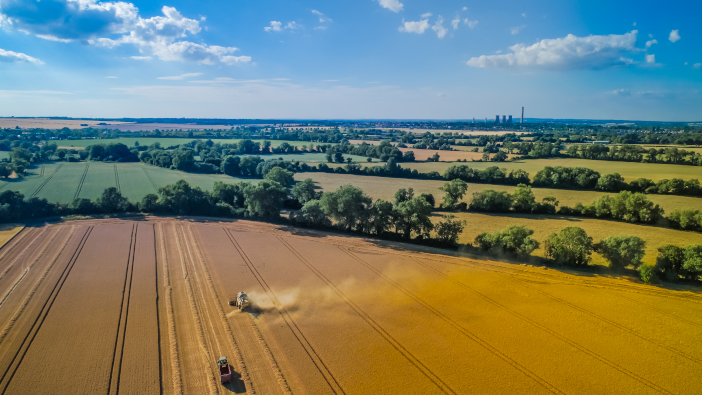The government has announced steps to assist farmers with the availability of fertilisers for the coming season.
Environment secretary, George Eustice has announced that changes to the use of urea will be delayed by at least a year. This delay will reportedly help farmers to manage costs and provide more time to adapt in light of globally rising gas prices.
Following consultation on urea restrictions, the government has also announced that future restrictions will include the use of ammonia inhibitors rather than a complete ban.
To further support farmers, revised and improved statutory guidance has been published on how farmers should limit the use of slurry and other farmyard manures at certain times of the year. There will also be new slurry storage grants this year to help them meet the Farming Rules for Water and reduce dependence on artificial fertilisers.
Alongside these new measures, Defra has announced more details of the Sustainable Farming Incentive (SFI), with money paid to farmers to help them sow nitrogen-fixing plants and green manures in their crops, or in advance of their crops to substitute some of their fertiliser requirements.
Finally, there will be an industry fertiliser roundtable, chaired by farming minister Victoria Prentis, to continue to work on these issues, identify solutions and better understand the current pressures on farmers.

Environment secretary, George Eustice, said: “The significant rise in the cost of fertiliser is a reminder that we need to reduce our dependence on manufacturing processes dependent on gas. Many of the challenges we face in agriculture will require a fusion of new technology with conventional principles of good farm husbandry. The measures we have announced today are not the whole solution but will help farmers manage their nitrogen needs in the year ahead.”
Mark Tufnell, president of the Country Land and Business Association said: “Whilst we welcome today’s announcements, it is important to recognise the sheer scale of the challenges ahead in the UK’s food production.
“The exceptionally high price of fertiliser can be mitigated only to a degree by high commodity prices. Some farmers may choose not to spread fertiliser at all this year. But if prices continued to stay at this all-time high then the government will need to urgently consider ways of increasing and diversifying domestic fertiliser production. We hope this will be a central focus of the round table DEFRA has rightly called.
“We welcome the news that DEFRA has accepted the industry’s advice to allow the continued use of urea within an accreditation scheme, audited by Red Tractor. This gives farmers a greater degree of choice when purchasing fertiliser.
“The announcement of payment rates for the Sustainable Farming Incentive, and additional guidance on the compatibility of the scheme with Countryside Stewardship, goes some way to explaining to farmers the impact of the agricultural transition on their own businesses.“
Soil Association Farming director Liz Bowles said: “We welcome the commitment from ministers to accelerate the reduction in our reliance on artificial nitrogen fertiliser and invest in soil health.
“It’s vital that we act differently to our post-war response in the 1940s by prioritising climate and nature alongside food security. The ongoing damage being done to soils, wildlife, and climate poses the biggest threat to food security and nature-friendly, agroecological farming provides the best path to ensuring long-term resilience.
“The transition needed cannot happen overnight, and a step-change in funding for farmer-led research and peer-to-peer learning will be essential. This will help farmers gain the confidence needed to recycle nutrients from livestock or nitrogen-fixing crops like clover in more complex rotations.
“We must build on and accelerate the plans to help farmers work with nature that has been set out in the Environmental Land Management schemes – and we look forward to hearing more detail on the upcoming organic standard and the higher level payments for improving soil health.”

NFU responds to Defra measures
Responding to this announcement, NFU president Minette Batters said: “Farmers are experiencing unprecedented costs when buying fertiliser, alongside tightening supplies, and it’s critical that government put in place measures to mitigate some of these effects.
“Many of the measures today, particularly around the industry-led regulation of urea, the updated guidance on the Farming Rules for Water which will allow autumn manure spreading, and the extension of Defra’s Market Monitoring Group to understand trends in the market, are positive for farmers. This is what the NFU has been asking for and I’d like to thank the government for making these changes.
“We will look at the guidance closely and we are continuing to engage with the government on the importance of fertiliser and about ways it can ensure stability and confidence in the food supply chain.”
Regarding further information about the Sustainable Farming Incentive, Mrs Batters said: “We support the move to a rolling application window as this will offer flexibility to farmers and growers to apply at a time that suits their business. This also needs to be matched by certainty over when agreements will start once an application has been submitted.
“While the offer available now will be suitable for some farms, it’s clear there are still not viable options for all. It’s essential for all farmers who wish to enter these new schemes that payment rates properly recognise the public goods they will be delivering. With such huge uncertainty, I remain extremely concerned that farmers in England are facing a very different approach from the rest of the UK. With farmers in England receiving less direct support, the government must ensure new ways of farmers and growers managing their risk and volatility.”

Responding to the new guidance for Farming Rules for Water, NFU deputy president Tom Bradshaw said: “Today’s announcement provides much-needed clarity for farmers and growers who have had significant concerns for some time about how the Farming Rules for Water regulations are being interpreted.
“Over the past year, the NFU has played an important role in bringing together the farming industry, Environment Agency and Defra to agree that organic manures can be spread in the autumn, so crops are receiving the vital nutrients they require. This new guidance will enable farm businesses to plan with confidence and importantly, drive improvements that benefit soil and plant health as well as water quality.”
Defra has also announced that there will be a farming industry self-regulation approach to the use of solid urea fertilisers. Mr Bradshaw added: “Working alongside other farming organisations, such as AIC, we put forward a strong case to Defra for a robust and pragmatic industry-led approach, without which would have meant a ban on the use of solid urea fertilisers.
“Spiralling input costs are impacting on all farmers and growers with nitrogen fertiliser now costing almost five times as much as it did this time last year and so we are pleased that Defra has agreed to our calls for a delay to the roll-out by a year until 2023 due to current market conditions.
“Through the involvement of Red Tractor, the industry has avoided the proposed outright ban on urea fertiliser which means that farmers and growers will continue to have the flexibility to use the right product at the right time.
“Today’s announcement means farmers and growers can keep using a vital product, to help grow sustainable climate-friendly food, while at the same time significantly cutting ammonia emissions in line with government and industry ambitions.”


